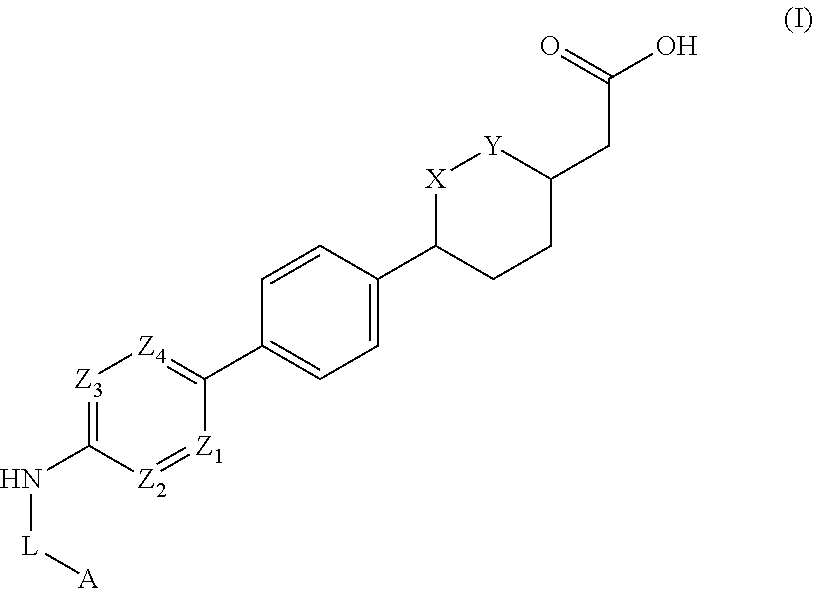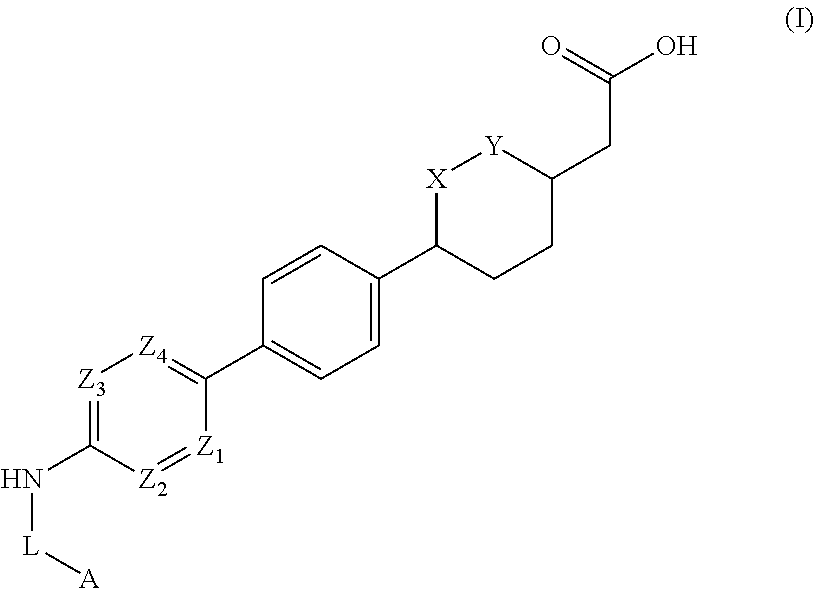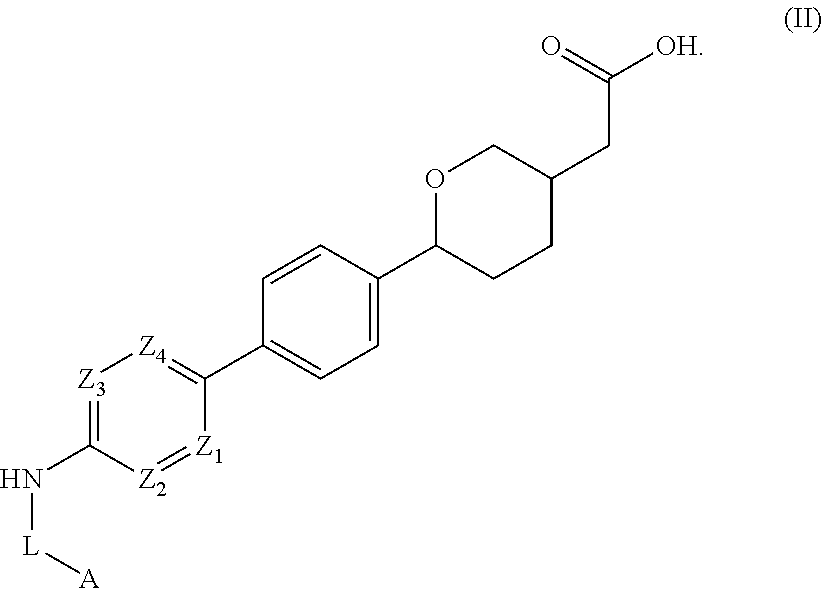Cyclic ether DGAT1 inhibitorscyclic ether DGAT1 inhibitors
a technology of cyclic ether and inhibitors, applied in the field of cyclic ether dgat1 inhibitors, can solve the problem of rare success of approaches
- Summary
- Abstract
- Description
- Claims
- Application Information
AI Technical Summary
Benefits of technology
Problems solved by technology
Method used
Image
Examples
example 1-5
2-(5-(4′-(2-methyl-5-(trifluoromethyl)oxazole-4-carboxamido)-[1,1′-biphenyl]-4-yl)tetrahydro-2H-pyran-2-yl)acetic acid
Step 1. Synthesis of Methyl 2-(4-bromophenyl)hex-5-enoate
[0204]
[0205]To a solution of methyl 4-bromophenylacetate (1 g, 4.37 mmol) in DMF (12 ml) at room temperature was added 60% NaH (0.227 g, 5.68 mmol) and the mixture was stirred at room temperature for 1 hr then was added 4-bromo-1-butene (0.487 ml, 4.80 mmol). The reaction was stirred at room temperature overnight. The reaction was quenched by sat. aq. NH4Cl and was extracted with EtOAc. The combined organic layer was washed with brine and dried over anhydrous sodium sulfate, filtered and concentrated. The residue was purified by flash chromatography (0 to 30% DCM / Hep) to give the title compound 1.1 g (yield 89%). Retention time 1.54 min (condition A).
Step 2. Synthesis of 2-(4-Bromophenyl)hex-5-en-1-ol
[0206]
[0207]To a solution of methyl 2-(4-bromophenyl)hex-5-enoate (870 mg, 3.07 mmol) in DCM (15 ml) at −78° C. ...
example 6
2-(5-(4′-((5-cyclobutyl-1,3,4-oxadiazol-2-yl)amino)-[1,1′-biphenyl]-4-yl)tetrahydro-2H-pyran-2-yl)acetic acid
Step 1. Synthesis of benzyl 2-(5-(4′-((5-cyclobutyl-1,3,4-oxadiazol-2-yl)amino)-[1,1′-biphenyl]-4-yl)tetrahydro-2H-pyran-2-yl)acetate
[0224]
[0225]To a solution of benzyl 2-(5-(4′-amino-[1,1′-biphenyl]-4-yl)tetrahydro-2H-pyran-2-yl)acetate (132 mg, 0.329 mmol) in DCM (5 ml) at room temperature was added 1,1′-thiocarbonyldipyridin-2(1H)-one (84 mg, 0.362 mmol) and the reaction was stirred at room temperature. 10 min the 1st step was done. To the mixture was added cyclobutanecarbohydrazide (75 mg, 0.658 mmol) and the mixture was stirred at room temperature until the 2nd step was done. To the mixture was added EDC.HCl (189 mg, 0.986 mmol) and the reaction was stirred at room temperature until done. The residue was purified by flash chromatography (10 to 60% EtOAc / Heptane) to give the title compound. MS (ESI) m / z 524.4 (M+1). Retention time 1.56 min (condition A).
Step 2. Synthesis ...
example 7-11
2-(6-(4′-((5-cyclobutyl-1,3,4-oxadiazol-2-yl)amino)-[1,1′-biphenyl]-4-yl)tetrahydro-2H-pyran-3-yl)acetic acid sodium salt
Step 1. Synthesis of 5-(4-bromophenyl)-2,5-dioxopentyl acetate
[0228]
[0229]To a round bottom flask containing 4-bromobenzaldehyde (1.4 g, 7.80 mmol), 2-oxobut-3-enyl acetate (1 g, 7.80 mmol) and 3-benzyl-5-(2-hydroxyethyl)-4-methyl-thiazolium chloride (0.21 g, 0.78 mmol) was added dioxane (20 ml). The mixture was stirred at room temperature and triethylamine (0.65 ml, 0.60 mmol) was added. The reaction mixture was heated to 80 C for overnight. Afterward, the reaction was cooled down to room temperature, quenched with a solution of saturated ammonium chloride and concentrated. The residue was taken up in MTBE and washed with saturated ammonium chloride solution twice, then once with brine. The organic portion was dried over sodium sulfate, filtered and concentrated. The resulting crude material was purified by column chromatography to afford the title compound as a ...
PUM
| Property | Measurement | Unit |
|---|---|---|
| enantiomeric excess | aaaaa | aaaaa |
| enantiomeric excess | aaaaa | aaaaa |
| enantiomeric excess | aaaaa | aaaaa |
Abstract
Description
Claims
Application Information
 Login to View More
Login to View More - R&D
- Intellectual Property
- Life Sciences
- Materials
- Tech Scout
- Unparalleled Data Quality
- Higher Quality Content
- 60% Fewer Hallucinations
Browse by: Latest US Patents, China's latest patents, Technical Efficacy Thesaurus, Application Domain, Technology Topic, Popular Technical Reports.
© 2025 PatSnap. All rights reserved.Legal|Privacy policy|Modern Slavery Act Transparency Statement|Sitemap|About US| Contact US: help@patsnap.com



